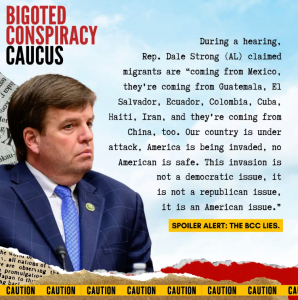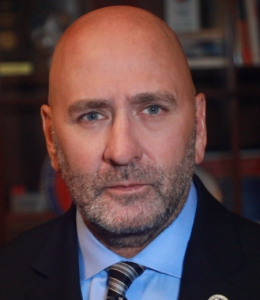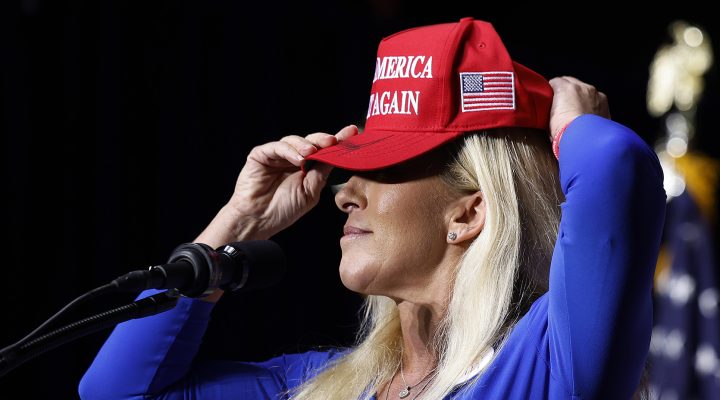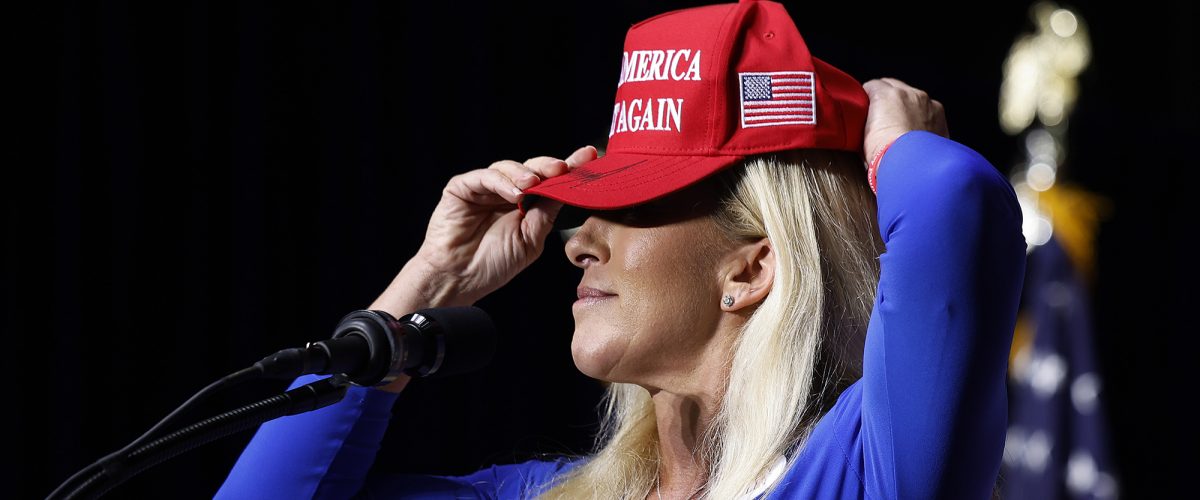Members of Congress who actively spread anti-immigrant conspiracy theories pose a significant threat to public safety and democracy, according to a report released by eight human, civil and immigrant rights groups.
The “Bigoted Conspiracy Caucus Report” examines the power and legitimacy elected officials bring to white supremacist movements by promoting the “great replacement” and other invasion theories in legislation, official hearings, public speeches, press releases, social media posts and op-ed pieces.
It’s not just Republican presidential candidate Donald Trump who is stirring fear of immigrants.
 Migrants are “coming from Mexico, they’re coming from Guatemala, El Salvador, Ecuador, Colombia, Cuba, Haiti, Iran, and they’re coming from China, too. Our country is under attack, America is being invaded, no American is safe. This invasion is not a democratic issue, it is not a republican issue, it is an American issue,” Alabama Rep. Dale Strong said during a 2023 congressional hearing with U.S. Customs and Border Patrol agents.
Migrants are “coming from Mexico, they’re coming from Guatemala, El Salvador, Ecuador, Colombia, Cuba, Haiti, Iran, and they’re coming from China, too. Our country is under attack, America is being invaded, no American is safe. This invasion is not a democratic issue, it is not a republican issue, it is an American issue,” Alabama Rep. Dale Strong said during a 2023 congressional hearing with U.S. Customs and Border Patrol agents.
By describing immigration as a national security issue, conservative lawmakers have raised the profile of ideas once relegated to the white supremacist fringe, the civil rights groups said. “This rhetoric threatens inclusive democracy, stokes division, pushes exclusionary rhetoric, and advances the conspiracy theory of ethnic replacement once related to the fringe.”
Scarier still, endorsing conspiracy beliefs spreads the paranoia and raises the likelihood of anti-immigrant and anti-Jewish attacks: “When policy makers champion this rhetoric from the dais, it creates a real climate of anti-immigrant fear mongering. From this climate, those who are motivated to commit violence can be spurred into action.”
While the centuries-old “great replacement” was overtly racist by alleging Jews and people of color seek to replace whites across Europe and the U.S., the strain hyped on Capitol Hill today usually only implies the racial or faith dimension. But the consequences are just as dangerous, the report explains.
“Today’s versions may generally avoid referencing race and religion explicitly, instead of emphasizing culture, immigration status or political power. Invasion conspiracies describe immigrants as ‘invaders’ who pose an existential threat to American ‘culture,’ or ‘traditions,’ and implicitly call for hate-fueled attacks to counter this imagined threat.”
Authors of the report connected replacement conspiracies to Trump-era mass shootings whose perpetrators typically professed racist and anti-invasion motivations for the attacks. These include the massacres of Jewish worshipers in Pittsburgh in 2018 and Poway, Calif., in 2019, Hispanic Walmart shoppers in El Paso in 2019 and Black grocery shoppers in Buffalo, N.Y., in 2022. The 2017 “Unite the Right” rally in Charlottesville, Va., included marchers chanting, “You will not replace us” and “Jews will not replace us.”
The study presents numerous examples of Congressional Republicans using their positions to spread replacement paranoia, including high-profile conspiracy theorist and 2020 election denier Rep. Marjorie Taylor Greene of Georgia.
“We want you to have a wall as one of the toolkits in your box to stop the illegal invasion into our country that’s occurring every single day,” she said during the 2023 hearing with Border Patrol officers.

Elijah Crane
Arizona Rep. Elijah Crane expressed hope that Department of Homeland Security budget hearings held last year would provide information to “all of you Americans out there that are wondering why we have this just complete invasion at our southern border.”
Rep. Clay Higgins of Louisiana added a warning about the “flood” of migrants at the border where the nation already has “lost” the war against the invaders. He also alleged DHS Alejandro Secretary Mayorkas “failed in your sworn oath to protect our nation from invasion.”

Clay Higgins
Researchers also link white supremacist replacement theories to Mayorkas’ impeachment by the U.S. House in February. The impeachment hearings were merely “a way to further amplify anti-immigrant and ‘invasion’ rhetoric via official channels.”
Conspiracy paranoia, meanwhile, has inspired the introduction of legislation such as the No Tax Dollars for the United Nations’ Immigration Invasion Act, which would cut U.S. funding for UN migrant and refugee services, and House Resolution 50, which would grant states the sovereignty to use force to oppose the “imminent danger” posed by migrants. Neither measure has become law.
Conspiracy theorists in Congress undermine American democracy by attempting to limit the political voice of Black and Hispanic communities with voter-suppression efforts, the report says.
“The conspiracy theory adds fuel to election deniers’ claims that elections cannot be trusted because the ballot box is polluted with fraudulent undocumented immigrant votes. When given legitimacy by members of Congress, it (erodes) public trust in elections and gives justification for overturning unfavorable results undermining the very ability of a democracy to function.”
The study concludes with numerous recommendations, including a plea to members of Congress to avoid using invasion language and to condemn it when it does arise: “While it is within our democratic principles to debate immigration policy, such dehumanizing and bigoted language — like that used by white nationalists, neo-Nazis, and mass murderers — has no place in the halls of Congress.”
The report was authored by America’s Voice, American-Arab Anti-Discrimination Committee, Bend the Arc, HIAS, Jewish Council for Public Affairs, Presente.org, Southern Poverty Law Center and Western States Center.


